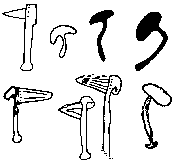The Synthetic_Universe
I started this blog nearly a year ago with full confidence in what themes it might eventually embody. However, regarding the thematic definition of the "Synthetic Universe", well, this has been difficult to pin down... until now.
The Synthetic_Universe is about culture. Specifically, culture is the "synthetic universe", one created and perpetuated by the human mind. Everything we experience in our universe is understood through culture. The symbols and beliefs of science and religion are both derived through culture. The labels we use to define our world, determine friend from foe, and maintain familial relationships are all products of culture. In our Synthetic Universe, we project value on currency, material goods, and food. In our Synthetic Universe, we watch movies, listen to music, and engage in sport. Within the Synthetic Universe we organize society, recognize authority, and enforce "law" through fear of reprisal. Our Synthetic Universe is very real. In truth, to us, it IS reality... yet, it is not the only reality.
Outside of the Synthetic Universe exists the environment: space, earth, ecology, community, the cosmos, etc. For purposes regarding this post I will refer to the natural environment as the "Entropic Universe", ie. the universe of matter and energy, time and decay. The Entropic Universe represents the antithesis of the Synthetic Universe in a manner analogous to the relationship between "entropy" and "negative-entropy", or -1 and 1. We humans exist between both the Synthetic and the Entropic Universes: our bodies consist of matter, space, and energy (i.e. the molecules and atoms that make up our cells), yet our REALITY exists within the Synthetic Universe.
Day by day, year by year, we live our lives from dream to dream. At any moment we possess memories of the past and plans for the future. Yet these represent only a small fraction of what truly exists. Our minds are influenced by cognitive filters that shape the entropic information we receive through our senses. The end product is the Synthetic Universe, a meaningful mosaic of memory, and a network of sympathetic human minds. Through the synthetic universe of culture, we maintain our identities.
I know the thoughts in this post open up a monumental can of worms, but that is the intent of this blog. It's time to explore the Synthetic Universe.
 the world is what we make it
the world is what we make it























